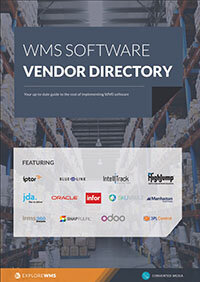10 quick actions you can take to improve warehouse security
Warehouse security is a tough tightrope to walk, and increasing it often feels overwhelming. You’ve got to balance protecting the company and products with setting the right tone and culture so that employees don’t feel like you’re always accusing them of something.
We’ve put together a few different methods you can use to start securing your warehouse quickly but also tie to larger initiatives that benefit employees too.
1. Use a WMS for automatic inventory counts
Manual data entry for inventory and shipment verification leaves plenty of room for mistakes and fraud. Instead, secure your inventory with accurate, automatic counts through your WMS and handheld device or RFID readers. You’ll reduce the chance of theft by adding goods into your system as soon as they arrive as well as eliminate opportunities for someone to fudge numbers to steal a product.
2. ID badges with RFID
In today’s warehouses, many RFID-enabled sensors and gates are used to track goods as they move from receiving to storage, down through picking and finally out the door. Adding RFID tags to existing employee IDs can use much of this same equipment to track activity and movement. This data can help you maintain personnel and asset security by monitoring for safety best practices as well as theft. IDs also help you monitor for delivery drivers or other individuals who should not be in certain areas of your warehouse.
Guide: get vver 120 WMS feature ideas to help you build a requirements list and shortlist vendors
3. Fence in your location
You can’t control what you haven’t contained. Fencing in your area is a smart way to keep people out of areas they shouldn’t access. It also creates an atmosphere of protection. Pair it with decent, bright lights and thieves may pick another target without pressing your security.
4. Install CCTV
For small warehouses, this can be a relatively quick action thanks to a new breed of Wi-Fi-enabled CCTV cameras. You’ll just need access to an outlet and Internet in your warehouse. They’re a great tool for protecting assets as well as staff. Even better news, CCTV can sometimes reduce insurance costs, especially if you can tie it to a reduction in injuries or losses.
5. Add motion detectors
Motion detection is a core part of most security systems, though sometimes warehouses stop at motion-activated lighting. Today, you’ve got access to a wide range of sensors that detect and track motion while sending alerts to managers or law enforcement. Keep people out of areas they shouldn’t be in with detectors as well as signage for the security system you use.
6. Use environmental controls and sensors
Security is more than just about preventing theft. You’ll also want to prevent damage to and loss of goods plus harm to your people. Look for ways to integrate your environmental controls into your dashboards. You can monitor the temperature to act quickly in case of a fire, monitor the status of refrigerators to prevent spoilage, and even track and reduce power consumption. Environmental sensors are a top defense against disasters and emergencies.
7. Hire security personnel
What’s the biggest gap in your warehouse security?
If you’re taking a second to think and aren’t sure, or worry you might not be right, it’s time to add a professional to your team. Security members aren’t primarily there to accuse your staff; they are there to protect your staff.
Someone committing fraud and theft may assault your staff, or continued theft can put jobs at stake. Tell your entire staff the reasoning behind security hires and show how it’s a move to protect them.
8. Secure all passwords
Today we see as many threats online as we do in the warehouse itself. The first step in keeping your system secure is to make passwords complex and enable two-factor authentication (2FA). You can use 2FA that sends a text message to employee phones or provide a dongle that displays a special password and updates regularly.
Keep your systems secure by implementing training for smart passwords as well as specifically spelling out when an employee should give out their password or when IT should give someone a new password.
9. Simplify your processes
How long has it been since you’ve reviewed your warehouse operations? Are teams spending a lot of time in the back corners away from others? Do you have dozens of touches for each order?
Over time, our warehouse work often adds layers on top of layers, and we just make do. We get used to all those steps. But, increased steps and waiting and other elements also increase the opportunity for threat or harm. Streamline your workflow, and you’ll remove some temptations as well as time to commit a crime — not only from internal sources but also external such as how long delivery drivers are left in your warehouse.
10. Engage with employees
Understanding the threats you face requires understanding your warehouse team. Get a feel for their impression of their jobs, gripes, complaints, what they like, and where they think problems may be occurring. You might be able to improve morale and reduce theft by implementing incentive programs or “thank you” programs or find out about problems you didn’t notice.
All-in-all, you can’t improve what you aren’t measuring. The best place to start with first is to get an understanding of what you have and where it’s headed.
Free white paper

WMS requirements template
Over 120 WMS feature ideas to help you build a requirements list and shortlist vendors

Featured white papers
Related articles
-

Warehouse picking and packing processes: how much labor do you need?
Logiwa's Erhan Musaoglu shows you how to calculate picking and packing labor requirements for you...
-

Mission-critical features of food lot traceability software
What features of food traceability software will help you during a food recall
-

Five key stakeholders in your WMS selection process
The stakeholders you will need on board for your WMS selection project, and what they can offer



